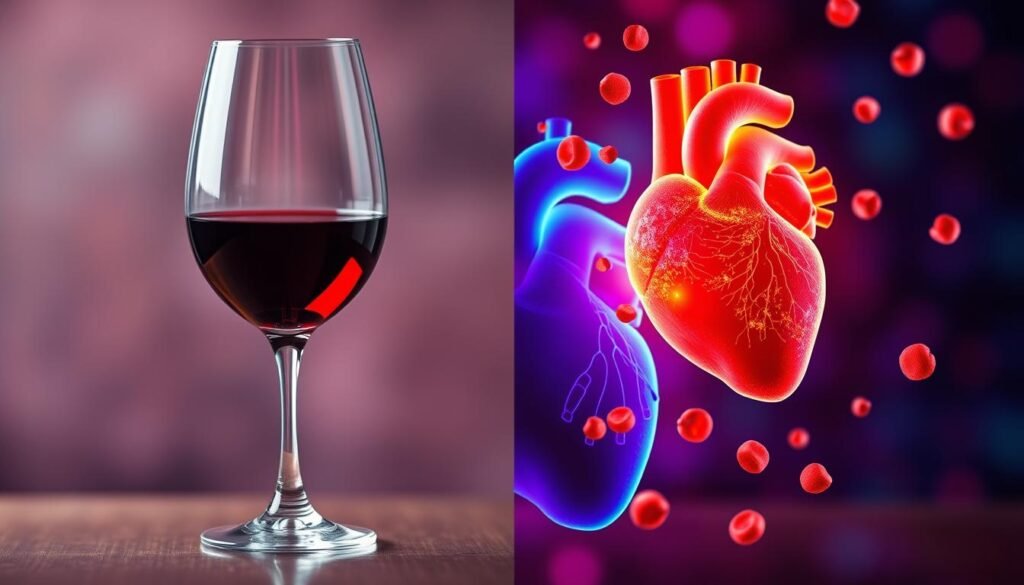Have you thought about how your weekend drinks affect your heart? The link between alcohol and cholesterol can be complex. Knowing how alcohol impacts cholesterol is key for a healthy heart. Studies show moderate drinking might boost good cholesterol. But, too much can harm your heart and increase bad cholesterol. Knowing how to balance alcohol and cholesterol is critical. For more details, read the insights at Healthline.
This article explores how alcohol and cholesterol interact. It highlights how even small amounts of alcohol can change your heart health.
Key Takeaways
- Moderate alcohol consumption may improve HDL cholesterol levels.
- Heavy drinking can increase LDL cholesterol and triglyceride levels.
- Understanding alcohol’s role is essential for individuals with high cholesterol.
- Consulting with healthcare professionals is advised for personalized advice.
- Responsible drinking could be part of a heart-healthy lifestyle.
Understanding Cholesterol and Its Importance
Cholesterol is crucial for our bodies. It helps make cell walls and is needed for making hormones and vitamin D. Learning about cholesterol teaches us its role in keeping our hearts healthy.
What is Cholesterol?
Cholesterol is a substance our bodies need but in small amounts. Our liver makes it, and it’s also in some foods. Too much cholesterol, though, is bad. Keeping an eye on cholesterol levels is key for heart health.
Types of Cholesterol: HDL vs LDL
There are two main types of cholesterol:
- HDL (High-Density Lipoprotein): Called “good” cholesterol, HDL takes cholesterol from arteries to the liver to get rid of it. High HDL means a lower heart disease risk.
- LDL (Low-Density Lipoprotein): This “bad” cholesterol carries cholesterol to body tissues, including artery walls. High LDL can cause plaque to build up, raising heart disease risk.
It’s important to keep HDL and LDL balanced for a healthy heart. Regular doctor visits help track these levels.
The Role of Cholesterol in Heart Health
Cholesterol’s effect on heart health is very important. Studies show that the right balance of cholesterol can prevent heart problems. A good HDL to LDL ratio is key to a healthy heart.
| Type of Cholesterol | Function | Health Impact |
|---|---|---|
| HDL | Transports cholesterol away from arteries | Protects against heart disease |
| LDL | Delivers cholesterol to tissues | Can lead to plaque buildup, increasing heart disease risk |
Alcohol and Cholesterol
The link between alcohol and cholesterol isn’t straightforward. It varies with the type and amount of alcohol you drink. Studies show that drinking in moderation might have a good effect on cholesterol. It can boost the “good” cholesterol, known as HDL.
How Alcohol Interacts with Cholesterol Levels
Alcohol is metabolized by the body in a way that impacts cholesterol. This can sometimes lead to good effects for people. For example, moderate drinking is linked to higher levels of HDL. This is good because HDL carries cholesterol from arteries to the liver, lowering heart disease risk. Alcohol can also affect the levels of LDL, or “bad” cholesterol.
The Effect of Various Types of Alcohol on Cholesterol
Not all alcoholic drinks affect cholesterol the same way. For instance, red wine might be good for heart health. It has antioxidants, like resveratrol, that could help with cholesterol. Beer and spirits, however, have different effects on cholesterol levels. Here’s how they compare:
| Type of Alcohol | Potential Impact on HDL | Potential Impact on LDL | Additional Benefits |
|---|---|---|---|
| Red Wine | Increases | May lower | Rich in antioxidants |
| White Wine | Moderate increase | Neutral | Lower calorie option |
| Beer | Limited increase | Can raise | Contains B vitamins |
| Spirits (e.g., vodka, whiskey) | Minimal impact | Neutral to increase | Can be mixed with low-calorie mixers |
The Relationship Between Alcohol Consumption and Cholesterol Levels
Many health studies have explored how alcohol affects cholesterol levels. They show that drinking in moderation might help manage cholesterol. This points out the possible pros while cautioning against the cons of too much alcohol.
The Impact of Moderate Drinking
Studies show that a little alcohol could be good for your cholesterol. It seems to boost HDL, the “good” kind of cholesterol. This good cholesterol helps carry away the bad kind to your liver, where it’s broken down.
People who drink moderately see an increase in HDL. This may lower their risk of heart problems. Moderation means up to one drink a day for women and two for men. This balance brings benefits without negative effects.
Heavy Drinking and Its Consequences
However, too much alcohol can harm your cholesterol and heart. It raises the “bad” LDL cholesterol, which clogs arteries. This can lead to heart disease.
Excessive drinking also increases the risk of high blood pressure and abnormal heart rhythms. This highlights the dangers of drinking too much.

Does Alcohol Raise Cholesterol?
The link between drinking alcohol and cholesterol levels is complex. Some research shows that a moderate amount of alcohol might increase good cholesterol, known as HDL. This type of cholesterol helps keep the heart healthy. Often, the positive effects are linked to specific drinks, like red wine.
Research Findings on Alcohol Intake and HDL Levels
Various studies have looked into how moderate alcohol use affects HDL cholesterol. For example, the Journal of Clinical Lipidology found that people who drink moderately have higher HDL cholesterol than those who don’t drink. This higher level of HDL has been connected to a lower chance of heart disease.
Discussing LDL Levels and Alcohol
However, when it comes to bad cholesterol, known as LDL, alcohol’s effects are more unpredictable. While moderate drinking might help HDL levels, too much alcohol can increase LDL levels. This can harm heart health. Research has shown that this rise in LDL from drinking too much increases the risk of heart problems later on.

Moderate Alcohol Consumption and Cholesterol
It’s important to know what moderate alcohol consumption means for health, especially related to cholesterol. Health groups say moderate drinking is one daily drink for women and two for men. This helps people get alcohol’s benefits while reducing risks.
Establishing What Moderate Drinking Means
Experts have a clear view on moderate drinking and its effect on cholesterol. The right amount of alcohol varies by person, but sticking to guidelines promotes health. Knowing how much to drink helps people make better choices.
Potential Benefits of Moderate Alcohol Consumption
Many studies point out alcohol’s positive effects on HDL cholesterol. Moderate drinking can raise “good” cholesterol, crucial for heart health. This may lead to improved heart wellness through better cholesterol balance.

Following the National Institute on Alcohol Abuse and Alcoholism’s advice fits well with moderate drinking. Their research links smart drinking habits with better cholesterol levels. It pushes people to think about their drinking and see moderation’s benefits.
Alcohol and High Cholesterol: Risks and Considerations
Understanding the risks of alcohol consumption is key for people with high cholesterol. Alcohol can make health problems worse. Knowing the risks from drinking is crucial.
Too much alcohol can raise cholesterol and increase heart disease risk. It can also cause stroke and liver issues.
Identifying Risks for Individuals with High Cholesterol
For those with high cholesterol, alcohol is tricky. In moderation, it may seem okay, but too much is harmful. This is because the liver turns alcohol into cholesterol and triglycerides.
This can raise cholesterol levels. It’s important to know about the dangers of bad drinking habits.
Advice for Those Diagnosed with High Cholesterol
It’s crucial to talk to doctors about drinking. They advise limited alcohol – two drinks a day for men, one for women. This helps manage alcohol intake and cholesterol.
Also, people should check their health often and talk with their doctors. Being aware of your health helps manage cholesterol better.
Lowering Cholesterol with Alcohol: Is It Possible?
Talking about alcohol and cholesterol shows some interesting options. The focus often lands on red wine’s health benefits for the heart. Studies say drinking in moderation is key when looking at alcohol to lower cholesterol.
Benefits of Red Wine and Heart Health
Red wine is famous for its possible benefits to heart health. This is thanks to resveratrol and antioxidants. They help by:
- Improving heart function
- Increasing levels of HDL (good) cholesterol
- Reducing inflammation in blood vessels
Drinking red wine in moderation might improve heart health and help lower cholesterol. Understanding how much alcohol to drink is very important. This balance is crucial for good health, so knowing about alcohol intake is key.
Discussing Other Alcoholic Beverages
Besides red wine, we also need to look at beer and spirits. Each type affects cholesterol differently. Beer has antioxidants like red wine but in varying amounts. Spirits don’t have these benefits but can be part of a healthy lifestyle if consumed cautiously.
| Type of Alcohol | Potential Benefits | Considerations |
|---|---|---|
| Red Wine | Contains resveratrol; may increase HDL cholesterol | Moderation is key |
| Beer | Contains some antioxidants; may improve heart health | Higher calorie content; excess can lead to negative health effects |
| Spirits | Can fit into a balanced diet | Lower in antioxidants; moderation required |
Learning the effects of different alcoholic drinks helps people choose wisely to lower cholesterol. With the right balance, it’s easier to gain heart health benefits.
Alcohol and Heart Health: The Bigger Picture
Looking into how alcohol affects heart health shows us important information about drinking over time. Drinking regularly impacts not just cholesterol but also heart health as a whole. It’s crucial to see how alcohol plays a part amidst other lifestyle choices when considering heart health.
Long-term Effects of Alcohol on Cardiovascular Health
Studies show that drinking alcohol can have mixed effects on the heart. A little bit might boost HDL cholesterol, helping protect the heart. But, drinking too much is harmful, increasing the chances of high blood pressure and heart diseases. It’s important to fully grasp the long-term effects of alcohol for making wise health decisions.
Understanding Alcohol’s Role in Overall Lifestyle Choices
Drinking is part of a bigger picture that includes diet, exercise, and whether or not you smoke. All these aspects of lifestyle can influence how alcohol affects heart health. Taking a broad view helps people see how all their choices shape their health. Knowing about the link between alcohol and heart health encourages smarter drinking habits.
| Factor | Positive Effects | Negative Effects |
|---|---|---|
| Moderate Alcohol Intake | Increases HDL cholesterol | None reported |
| Excessive Alcohol Intake | None reported | Increases risk of CVD, hypertension |
| Lifestyle Factors | Good diet, exercise enhance benefits | Poor diet, smoking complicate outcomes |
Conclusion
It’s key to know how drinking alcohol affects cholesterol and heart health. This article looked into cholesterol’s complexity, explaining HDL and LDL. It also showed how different drinks impact these levels. While some drinking can be okay, too much is harmful, especially for people with high cholesterol.
In the end, choosing how much to drink is important. People need to think about how it could affect their heart health. Talking to a doctor can help decide the best way to manage cholesterol and drinking.
Learning about alcohol and cholesterol helps people make better choices. Knowing this can lead to a healthier heart over a lifetime. Remember, being aware and moderate with drinking is crucial for heart health.